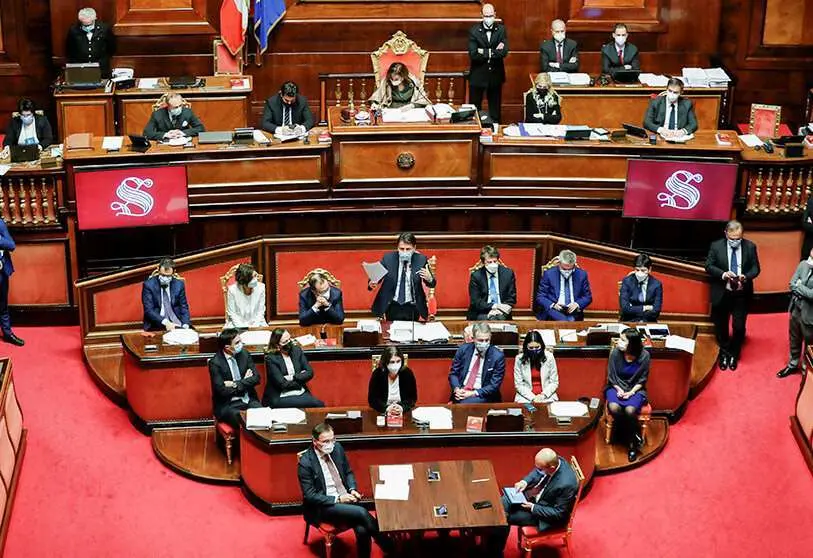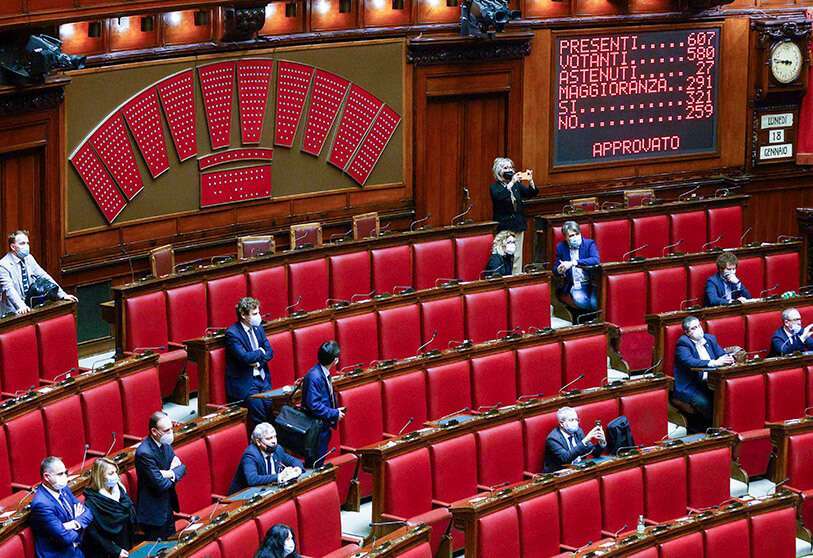Italy: The Government obtains Chamber's confidence but shows weakness

Finally, Prime Minister Conte has gained the confidence of both chambers and, for the time being, he can move forward, although with a more uncertain future than ever. As was to be expected, the weakness of the current Executive became evident not in the Lower House, where it was known that there were too many votes to achieve an absolute majority, but in the Second House (the Senate), where, at most, except for a monumental surprise, it could achieve a simple majority. And so it was, including a deplorable show of vote buying and selling (in exchange for what? We will know in a short time) that turned the Upper House into a real Persian market. The fact is that, if the second Conte Government did not fall this Tuesday, it was because Matteo Renzi did not want it to: the 16 votes of difference that the "yes" to the continuity of the Executive obtained against the "no" are one less than those that Renzi's Italia Viva has, which had already announced its abstention and kept its word until the end.
Actually, the current government coalition doesn't even really have those 156 votes. Because they voted in favor of senators who really shouldn't be counted on to continue governing, for various reasons. Liliana Segre voted in favor, a senator for life who, in addition to already being a nonagenarian (she survived the Holocaust despite her Jewish status, which did not prevent her from being interned in Auschwitz), does not live in Rome, the seat of the Senate, but in Lombardy, from where she moved for the vote. Former Prime Minister Mario Monti, a prestigious economist and university professor known for being ideologically right-wing, also voted in favor, which would make him quickly disagree with the policy carried out by a center-left coalition. And those of the Group for Autonomy voted in favor, basically parliamentarians belonging to the South Tyrolean People's party (SVP) and therefore, ideologically, like Monti, right-wing, in addition to being known to be rigorous in their actions, which would make it difficult for them to withstand this government's refusal to apply the MES.
So the real starting point of this Government is the sum of the Five Stars, Democratic Party and Free and Equal Senators, which together do not even add up to 140 parliamentarians, more than 20 from the absolute majority. This figure is too low to face the very hard months in which recession, unemployment and indebtedness will begin to take hold and wreak havoc, not to mention that the "health emergency" is anything but over at this time
That day in the Senate left us with many elements for reflection. The first, that the main center-right party (Forza Italia), is in clear decomposition: two of its senators voted in favor of the continuity of a prime minister appointed there by Five Stars movement, which is the same party that attacked without mercy former Prime Minister Berlusconi. "Il Cavaliere", who has just turned 84, is already in retirement and is now a member of the European Parliament, and the man chosen to replace him, the former president of the Italian Parliament, Antonio Tajani, is a man of character and leadership skills, but he lacks the charisma and capacity to drag the Lombard politician and businessman. This week alone, with the motion of confidence, the party has lost three more parliamentarians, one in the Lower House and two in the Upper House, to which must be added those who have left since the beginning of the legislature.

The second issue is precisely in relation to the first, being the strategic move of former Prime Minister Matteo Renzi. The still young Tuscan politician is a classic Christian Democrat who had to begin his political career (that is, exerting government) already in the ranks of the Democratic Party, a group created to defeat the center-right and incorporated anything else outside this ideological line: ex-communists, socialists, ecologists, Republicans and even Christian Democrats of the left wing (one of them precisely Matteo Renzi). Now that part of the space of the center-right is free, Renzi plans to bring Italia Viva into it. And the media are a faithful reflection of this: while those of the center-right limit themselves to disagreeing with what Renzi is doing and, above all, to criticizing him for sustaining a center-left coalition, those linked to the Democratic Party and Five Stars have continued to attack him without mercy in spite of the fact that, as we say, Renzi's party was key to sustaining the current government coalition. This explains why the former Prime Minister has not only abandoned the coalition but is already beginning to talk about his formation supporting a "Government of National Unity", which is the same as opening the door to making a pact with the center-right. The condition that Renzi would place, of course, is that at the head of this "government of national unity" there should not be a sovereign like Matteo Salvini, but a declared European, as is the case with Antonio Tajani, to give an example.
Finally, the third issue that could be seen in the Senate is that Five Stars and Democratic Party, with the Prime Minister at their head, are willing to do anything so as not to lose control of the government. Let's take two examples of this. One is Senator Giarrusso: a former member of the Five Stars Movement and now in the Mixed Group, who acknowledged that, as long as he voted in favor of the continuity of the current "premier", he was offered almost to be "Pope!" (with evident derision he said that the two existing ones were enough, in reference to the Pope emeritus and the one who currently governs the Holy See). Another one is Senator Ciampolillo: he entered "in extremis" to vote "yes" (he was only one minute away from staying out of the second and definitive vote) because, judging by what he himself has said, he should have been offered just before voting for a Ministry. This is not surprising, since it has been known since last weekend that many senators (the majority ex-members of Five Stars and now in the Mixed Group) have been offered everything and more as long as they give their "yes" to the continuity of the current Executive.
Now it should be the President of the Republic, Sergio Mattarella, who decides what to do. For the moment, he will let a few weeks go by, to see if the current coalition finally manages to forge the new "maggioranza" it has not achieved up to now. However, if this is not achieved, it would have to decide whether to accept the continuity of an Executive in parliamentary minority (which could lose one vote after another in the Senate) or to appoint a new government on the basis of calling elections as soon as possible, which is not possible due to the very difficult health situation at the moment. Time is proving Matteo Renzi right: without his party, the current coalition cannot govern. If in the coming weeks a new "maggioranza" is forged, time will tell. The current government has managed to save itself "in extremis", but to face the challenges of the future, it will have to widen its parliamentary base. And it doesn't seem the best idea to do so on the basis of "defectors" who will be with this one today and with others tomorrow. This is something that comes from selling oneself to the highest bidder.
Pablo Martín de Santa Olalla Saludes is Professor of European History at the ESERP University Centre and author of the book Italy, 2013-2018. Del chaos a la esperanza (Madrid, Liber Factory, 2018).

